I’ll never forget the moment I caught my reflection in a coffee shop window and did a double-take. Was that me? My face looked… different. Slimmer, sure, but also kinda hollow, with lines I didn’t remember having. I’d been on Ozempic for a few months, dropping pounds like nobody’s business, and I was thrilled until I noticed my face. It wasn’t just thinner; it looked older, almost like someone else was staring back. I felt this weird mix of pride for my weight loss and shame for not loving the new me 😕
That’s when I learned about “Ozempic face,” a term floating around for the gaunt, sometimes aged look that can come with rapid weight loss from meds like Ozempic. It’s not just a physical thing it’s an emotional gut-punch. You’re supposed to be happy about losing weight, right? So why don’t we talk about the feelings that come when your face changes in ways you didn’t expect? The shame, the identity shifts, the quiet worry that you don’t look like “you” anymore?
In this article, we’re diving deep into how weight loss changes your face, what “Ozempic face” really means, and why the emotional side of it gets swept under the rug. We’ll share real stories, practical tips for managing those changes, and ways to embrace your new look without losing yourself. Plus, we’ll answer those burning questions like, “Does losing 5 pounds really change your face?” and “What can I do about it?” If you’re navigating this journey, stick with me we’re gonna figure this out together 😊

What Is Ozempic and How Does It Work?
Let’s start with the basics. Ozempic is a medication, technically called semaglutide, originally designed to help manage type 2 diabetes. It works by mimicking a hormone called GLP-1, which regulates blood sugar and, here’s the kicker, makes you feel full longer. That’s why it’s become a go-to for weight loss less hunger means fewer calories, and the pounds start coming off. Some folks lose 20, 30, even 50 pounds in a matter of months. Sounds like a dream, right?
But here’s the catch: rapid weight loss, especially with meds like Ozempic, can change more than just your waistline. It can transform your face in ways you might not expect, and that’s where things get complicated. WebMD explains that while Ozempic is a game-changer for many, it’s not without side effects, including potential changes in appearance. And those changes? They can hit you right in the feels
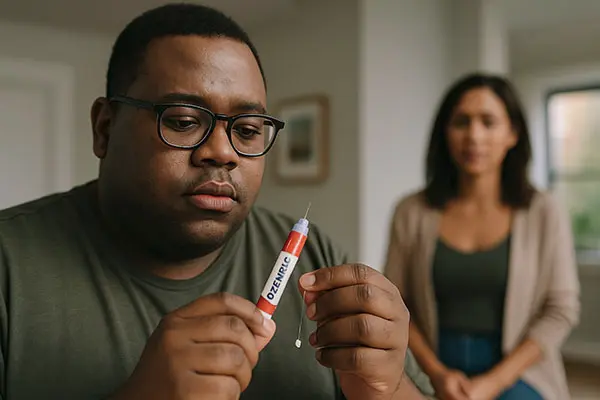
How Weight Loss Changes Your Face
So, how exactly does weight loss mess with your face? When you shed pounds, you’re losing fat from all over your body, including those chubby cheeks you might’ve loved (or hated). Facial fat acts like a natural filler, keeping your skin plump and youthful. Lose that fat, and your face can look slimmer, more defined, or sometimes especially with rapid weight loss a bit hollow or saggy.
Here’s what happens:
- Fat Loss: Your cheeks, jawline, and under-eye areas lose volume, which can make your face look sharper but also less full.
- Skin Elasticity: If you lose weight quickly, your skin might not have time to tighten up, leading to sagging or wrinkles. Older folks or those with less elastic skin might notice this more.
- Bone Structure: Less fat can make your cheekbones and jawline pop, sometimes giving a chiseled look or a gaunt one, depending.
We are not just changing bodies we are changing faces. And in those changes, we can lose sight of the person we used to recognize.”
Dr. Renee Engeln, author of “Beauty Sick”
Does your face change when you lose weight? Yup, it’s pretty common. The extent depends on a few things:
- Age: Younger skin bounces back better; older skin might sag more.
- Genetics: Some people’s skin is just more resilient.
- Weight Loss Speed: Fast loss, like with Ozempic, can be more dramatic.
- Amount Lost: More weight lost means more noticeable changes.
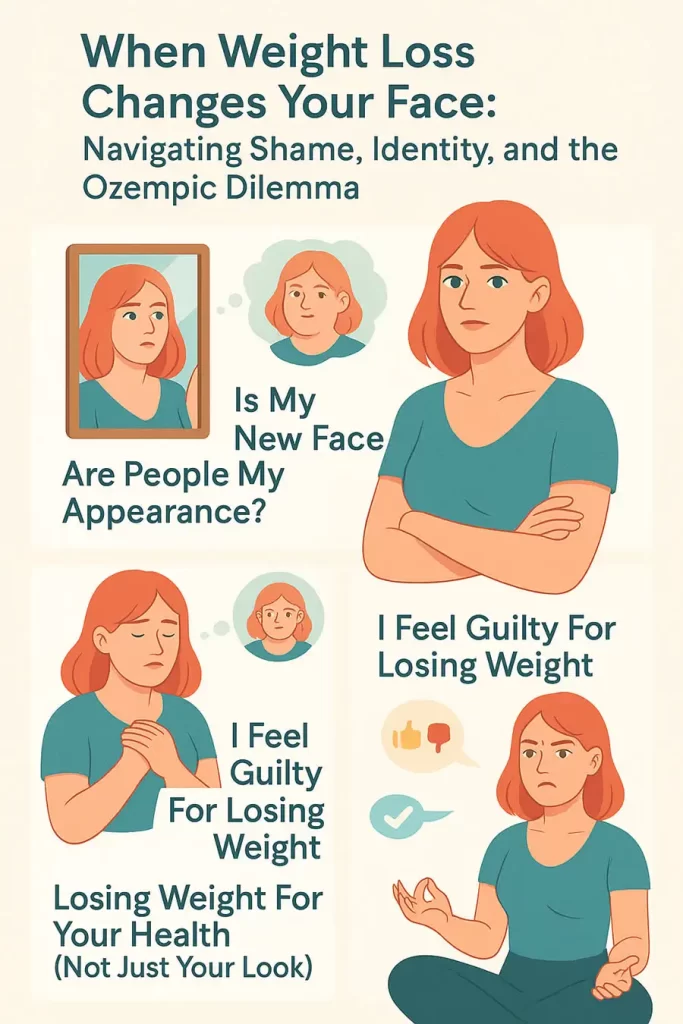
Can Losing 5 Pounds Change Your Face?
You might be wondering, “Does losing just a little weight, like 5 pounds, really make a difference?” It can, especially if you’re already at a lower weight or have a smaller frame. Five pounds might not sound like much, but it can reduce puffiness in your cheeks or slim down a double chin, making your face look more defined. I noticed this when I dropped a few pounds my jawline got a bit sharper, and I was like, “Whoa, is that me?” 😄

Is Losing 6 Pounds Noticeable?
Similarly, losing 6 pounds can be noticeable, depending on your starting point. If you’re carrying less body fat, those 6 pounds might show up in your face first, giving you that “I’ve been working out” glow. But if you’ve got more to lose, it might take a bit more for others to notice. Either way, you’ll probably see it in the mirror before anyone else does.
How to Tell If You Lost Weight in Your Face
Not sure if your face is changing? Here are some signs:
- Your cheekbones are more prominent.
- Your jawline looks sharper or more defined.
- Your cheeks feel less full or “chubby.”
- You notice new lines or slight sagging, especially around the mouth.
- Your eyes might look bigger (more on that later).
I started noticing these changes when I compared old selfies to new ones. It’s subtle at first, but once you see it, you can’t unsee it
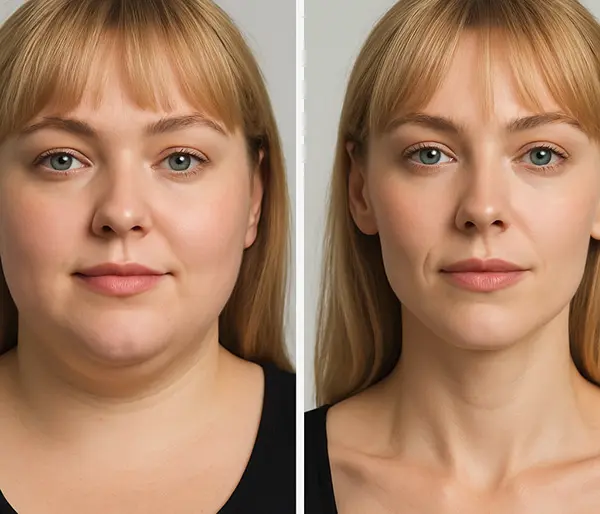
Is Your Face the First to Lose Weight?
Here’s a common question: “Is my face the first place to lose weight?” It depends. Your body decides where to burn fat based on genetics, hormones, and body composition. Some folks lose weight from their face first, noticing slimmer cheeks before their jeans feel looser. Others might slim down in their waist or legs first. There’s no universal rule, so don’t stress if your face isn’t changing right away or if it’s changing too fast.
Do Eyes Look Bigger After Weight Loss?
One cool side effect? Your eyes might look bigger after weight loss. Why? Losing fat around your eyes and cheeks can make them stand out more, giving them a more prominent, wide-eyed look. It’s like nature’s highlighter, making your features pop. I noticed this after losing about 10 pounds my eyes seemed to take up more space on my face, and I kinda loved it. 😊
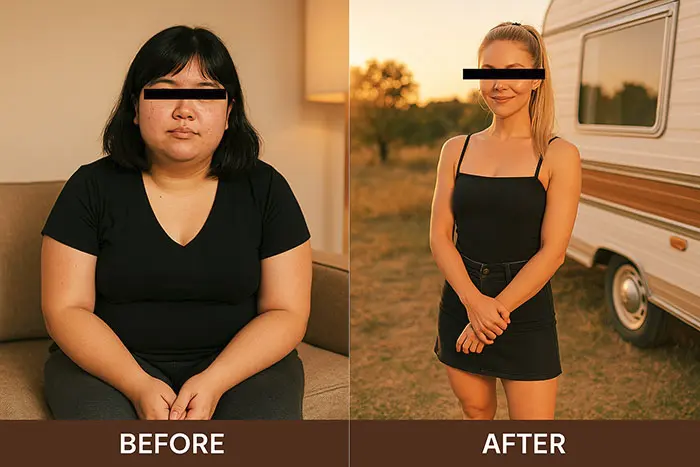
Understanding ‘Ozempic Face’
Now, let’s get to the heart of it: what’s “Ozempic face”? It’s a term that’s popped up to describe the gaunt, sometimes aged look some people get after rapid weight loss with Ozempic or similar meds like Wegovy. When you lose weight fast, your body burns fat quicker than your skin can adapt, especially in your face. This can lead to:
- Hollow cheeks or under-eye areas.
- More visible wrinkles or sagging skin.
- A generally “older” appearance, even if you’re young.
Healthline explains that “Ozempic face” happens because facial fat is one of the first places to go when you lose weight rapidly.
Unlike gradual weight loss, where your skin has time to adjust, meds like Ozempic can speed things up, leaving your face looking deflated.
It’s not just a cosmetic thing it can hit your confidence hard, especially if you weren’t expecting it.

Why does this happen more with Ozempic? The drug’s appetite-suppressing power can lead to significant weight loss in a short time sometimes 20-30 pounds in a few months. That’s a lot for your skin to keep up with, especially if you’re older or have less elastic skin
The Emotional Rollercoaster We Don’t Talk About
Here’s where things get real. Weight loss is supposed to be this big win, right? Everyone’s cheering you on, saying, “You look amazing!” But what if you don’t feel amazing? What if you look in the mirror and see someone who doesn’t feel like you? That’s the emotional side of “Ozempic face” we don’t talk about enough.
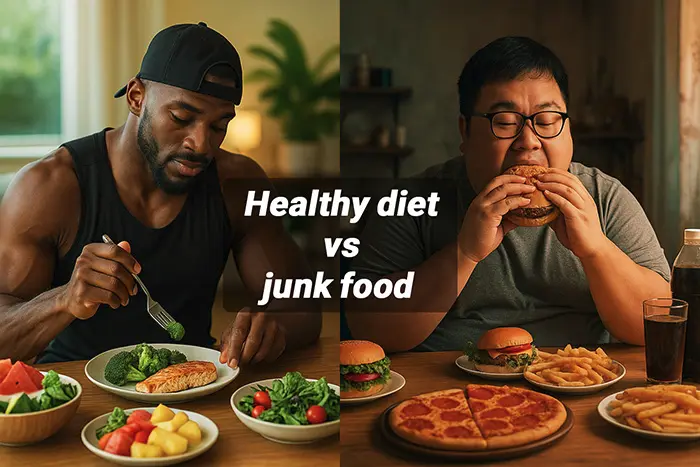
Shame and Self-Doubt
There’s a weird shame that comes with not loving your new look, especially when society’s screaming, “Thinner is better!” Admitting you’re not thrilled can feel like you’re ungrateful or vain. I felt this when I noticed my face looking older after losing weight. I was like, “I should be happy, so why am I kinda freaking out?” It’s okay to have mixed feelings weight loss is a big change, and it’s normal to need time to adjust.
Identity Shifts
Your face is a huge part of your identity. It’s how you recognize yourself, how others know you. When it changes, it can feel like you’re losing a piece of who you are. Psychology Today says significant physical changes can trigger identity crises, making you question your sense of self. I had a moment where I didn’t recognize my own smile in photos it was unsettling, like I was meeting a stranger.
Why We Don’t Talk About It
So, why the silence? For one, weight loss is so glorified that any downside feels taboo. You’re supposed to be grateful, not complaining. Plus, there’s stigma around vanity caring about your looks can feel shallow, even if it’s really about feeling like you. And let’s be real: the medical world focuses on the health benefits of weight loss, not the emotional fallout. But those feelings? They’re valid, and they deserve space

Real Stories: How Much Did Your Face Change?
To make this hit home, let’s share some stories. These are based on real experiences I’ve read about or heard from friends, tweaked to keep things private.
Sarah’s Story
Sarah, 35, started Ozempic for diabetes and lost 40 pounds in six months. “I was stoked about the weight loss,” she says, “but then I noticed my face. My cheeks were sunken, and I had lines I didn’t have before. I felt like I aged a decade overnight.” The compliments from friends didn’t help she felt like a fraud for not loving her new look. Sarah ended up talking to a dermatologist, who suggested fillers to restore some volume. “It wasn’t about being vain,” she explains. “I just wanted to feel like me again.”
Alex’s Journey
Alex, 28, is non-binary and has always wrestled with body image. After losing 25 pounds on a similar med, they noticed their face looked sharper but also more masculine, which clashed with their identity. “It was confusing,” Alex shares. “I liked being healthier, but I didn’t feel like myself.” They found solace in online forums where others shared similar struggles. Alex started experimenting with makeup and hairstyles to align their look with their identity, and it helped them feel more at home in their skin.
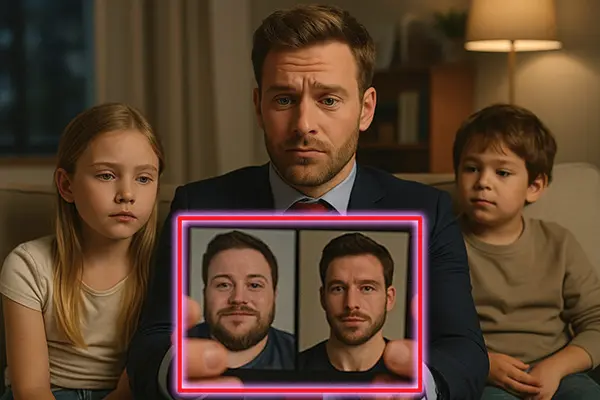
These stories show that facial changes after weight loss aren’t just physical they’re deeply personal. How much your face changes depends on how much weight you lose, how fast, and your unique body. For some, it’s a subtle shift; for others, it’s a total transformation
What You Can Do About Facial Changes
If you’re dealing with “Ozempic face” or just not loving how your face looks after weight loss, you’ve got options. Here’s how to manage those changes, both physically and emotionally:
Physical Strategies
- Consult a Dermatologist: A pro can suggest treatments like dermal fillers, microneedling, or laser therapy to restore volume or tighten skin. American Academy of Dermatology says fillers can help with hollow cheeks, but talk to your doctor first to weigh risks and costs.
- Boost Nutrition: Eat a diet rich in protein, healthy fats, and vitamins like C and E to support skin health. Think salmon, avocados, and leafy greens. Staying hydrated is huge too aim for 8 glasses of water a day.
- Try Facial Exercises: Some swear by facial yoga to tone muscles and reduce sagging. Moves like cheek lifts or jaw stretches might help, though evidence is mixed. I tried a few YouTube tutorials, and while I didn’t see miracles, it felt good to do something.
- Skincare Routine: Use moisturizers with hyaluronic acid or retinol to improve skin elasticity. Sunscreen’s a must to protect your skin from further damage.

Emotional Strategies
- Practice Self-Compassion: Remind yourself it’s okay to feel conflicted. Try journaling about your feelings I did this and wrote, “I’m proud of my health, but I miss my old face.” It helped me process.
- Talk It Out: Share your thoughts with a friend or therapist. Sometimes just saying, “I don’t love how I look,” takes the weight off.
- Reframe Your Identity: Focus on parts of yourself that aren’t tied to looks like your kindness or creativity. I started celebrating my small wins, like sticking to my workout routine, and it boosted my confidence.
- Limit Comparison: Social media can make you feel worse about your changes. Unfollow accounts that trigger insecurity and follow ones that inspire self-love.
Addressing the “It’s Vain” Objection
You might think, “Caring about my face is shallow.” Nope. Your face is part of your identity, and it’s okay to want to feel good about it. Caring about your appearance doesn’t mean you’re vain it means you’re human. These strategies aren’t about chasing perfection; they’re about feeling like you
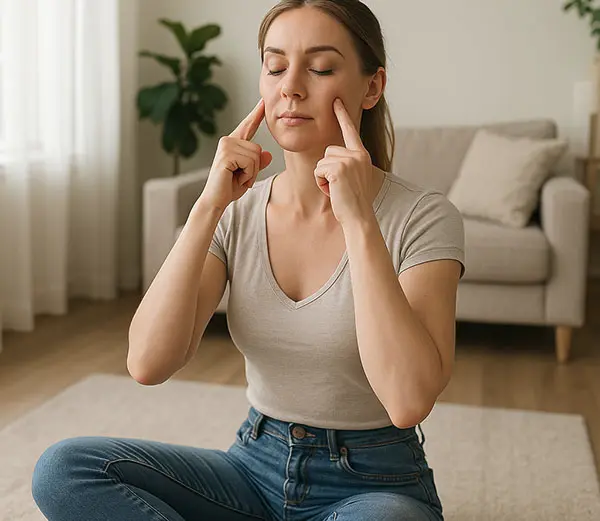
Ozempic Face and the LGBTQ+ Community
For folks in the LGBTQ+ community, the emotional impact of “Ozempic face” can hit differently. Body image is already a loaded topic, with societal pressures and identity struggles adding extra layers. Rapid weight loss might align with some goals but clash with others, like gender expression or self-perception. For example, a trans person might find that a slimmer face changes how they’re perceived, which can trigger dysphoria or insecurity.
Finding affirming spaces is key. Online communities, like those on Reddit or Discord, can offer support from others who get it. A friend of mine who’s queer said joining a body-positive group helped them process their feelings about their changing face. They learned to focus on what made them feel authentic, like experimenting with makeup or clothing. If you’re navigating this, seek out spaces where you can be yourself without judgment it’s like a warm hug for your soul. 😊
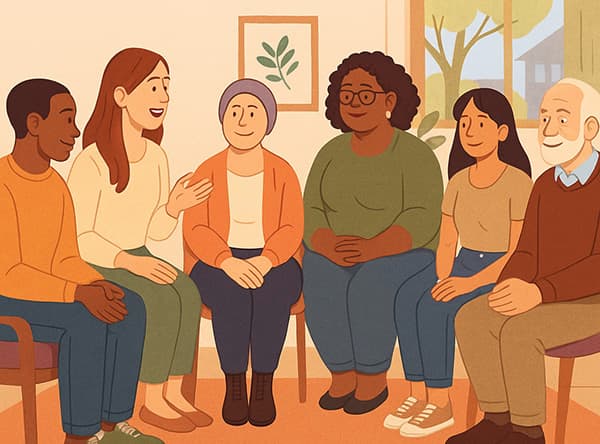
Some Questions
Let’s tackle some questions you might have about weight loss and facial changes:
| Question | Answer Summary |
|---|---|
| Does your face change when you lose weight? | Yes, often slimmer or gaunt. |
| Can losing 5 pounds change your face? | Subtle changes possible, especially if lean. |
| Is losing 6 pounds noticeable? | Can be, depending on body composition. |
| How to tell if you lost weight in your face? | Look for defined cheekbones, jawline, or lines. |
| Is your face the first to lose weight? | Varies by genetics. |
| What is the Ozempic face? | Gaunt look from rapid weight loss. |
| Do eyes look bigger after weight loss? | Yes, due to less facial fat. |
| How much did your face change? | Varies widely by individual. |
The Science Behind It
From a neuroscience perspective, rapid physical changes like those from weight loss can mess with your brain’s sense of self. The brain’s body image map, stored in areas like the parietal cortex, takes time to update when your appearance changes. This mismatch can lead to feelings of disconnection or discomfort, per Scientific American. Hormonally, stress from these changes can spike cortisol, making you feel anxious or unsettled. Managing these feelings through mindfulness or therapy can help your brain catch up with your new look
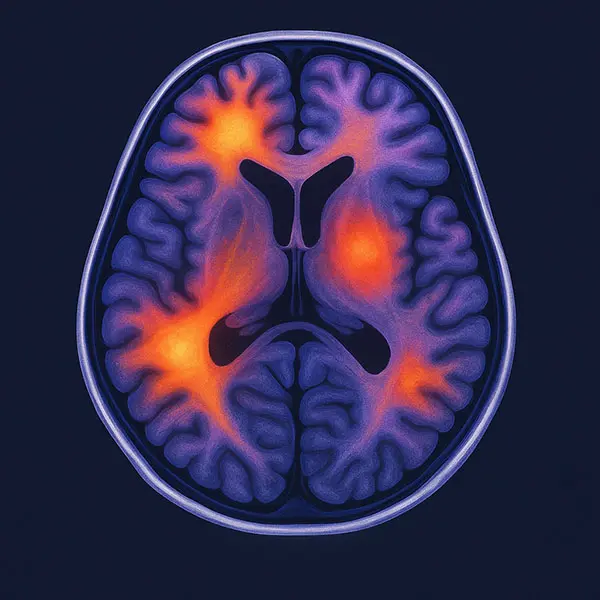
Conclusion
Weight loss is a wild ride, full of highs and lows. While dropping pounds can boost your health and confidence, it can also change your face in ways that catch you off guard like the gaunt look of “Ozempic face.” Those changes aren’t just physical; they can stir up shame, identity questions, and a whole lotta feelings we don’t talk about enough. But you don’t have to navigate this alone.
Whether you’re exploring medical options like fillers, tweaking your diet for better skin health, or just learning to love your new reflection, it’s all about finding what makes you feel good.
If you’re struggling, talk to a friend, a therapist, or even an online community they’re out there, ready to lift you up.
Your face might look different, but your worth? That’s unchanged. So, take a deep breath, give yourself some grace, and keep shining. You got this. 😊

Feeling conflicted about your weight loss journey? Share your story in the comments or reach out to a friend. You’re not alone, and your feelings matter
Resources related to this topic
- Psychology Today: Emphasizes that sensitivity is not a flaw, but a strength when used constructively .
- Harvard Health (Medical School): Presents emotional intelligence as a learned set of skills that enhance empathy, communication, and well-being .
Related articles that I recommend not to miss
Common Questions Answered
Yes, losing weight often reduces facial fat, leading to a slimmer or sometimes gaunt appearance, depending on how much and how fast you lose.
It can, especially if you’re leaner to start with. Five pounds might slim your cheeks or jawline, making subtle changes noticeable.
Similar to 5 pounds, 6 pounds can be visible in your face, particularly if it reduces puffiness or defines features like cheekbones.
Look for sharper cheekbones, a more defined jawline, less cheek fullness, or new lines. Comparing photos can help.
It depends on genetics some lose facial fat first, others see changes elsewhere like the waist or legs.
It’s the gaunt, sometimes aged look from rapid weight loss on Ozempic, caused by quick fat loss that skin can’t keep up with.
Often, yes less fat around the eyes can make them appear larger or more prominent.
It varies. Some see subtle shifts, like sharper features; others notice dramatic changes, like hollow cheeks or sagging skin.
Consult a dermatologist for treatments like fillers, eat a nutrient-rich diet, stay hydrated, try facial exercises, and practice self-compassion.

How to Start Managing Facial Changes After Weight Loss
Time needed: 20 minutes
- Reflect on Your Feelings
Journal about how your new look makes you feel to process emotions like shame or confusion.
- Talk to a Pro
See a dermatologist for options like fillers or skin tightening to restore volume.
- Nourish Your Skin
Eat protein, healthy fats, and stay hydrated to support skin elasticity.
- Try Facial Yoga
Experiment with exercises to tone facial muscles, like cheek lifts or jaw stretches.
- Seek Support
Talk to a friend, therapist, or online community about your experience.
- Limit Comparison
Unfollow social media accounts that trigger insecurity and focus on self-love.
✨ Last updated on 03.08.2025
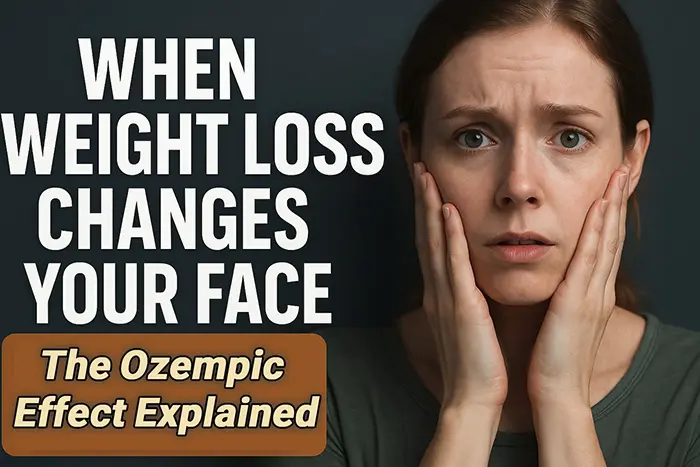










Leave a Reply